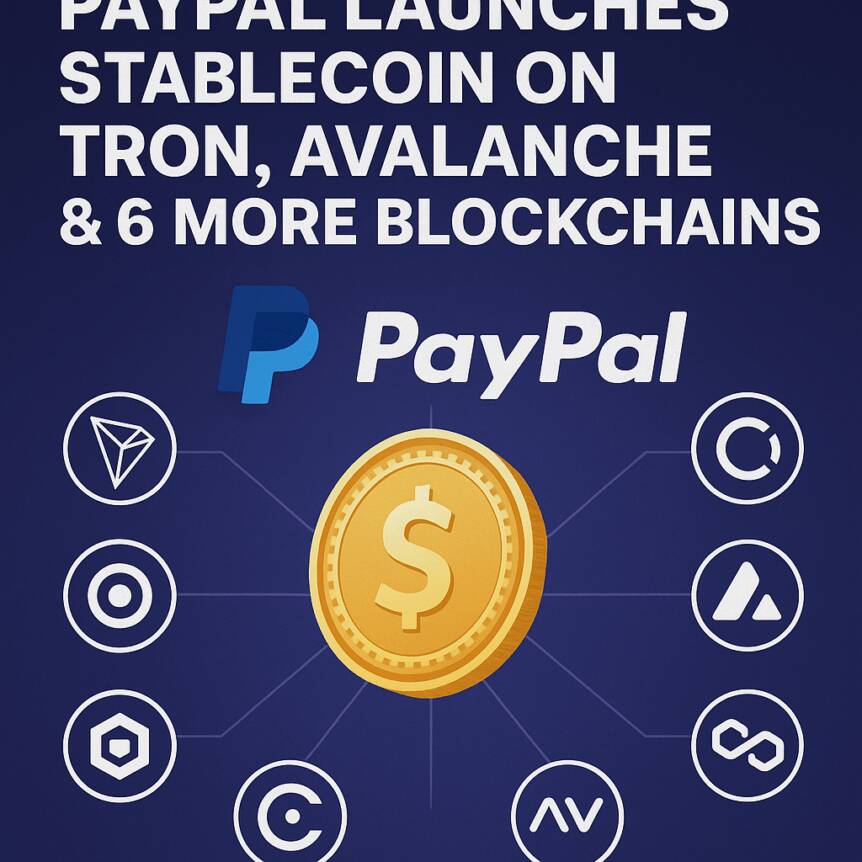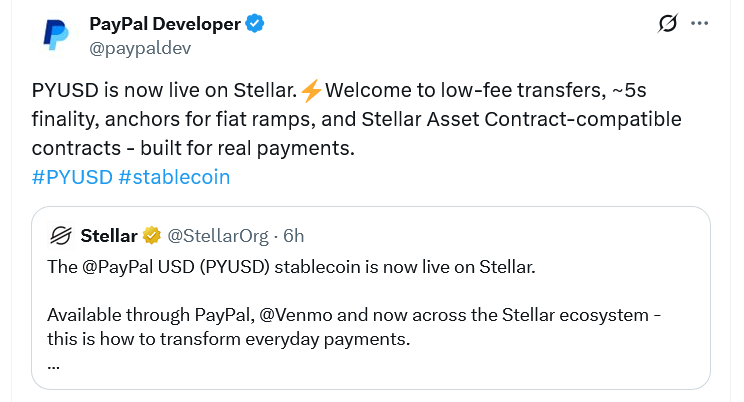PayPal Launches Stablecoin on Tron, Avalanche & 6 More Blockchains

Payments giant PayPal is broadening the reach of its stablecoin, PayPal USD (PYUSD), by integrating it across eight additional blockchains, primarily through LayerZero’s Stargate Hydra bridge. This move aims to create a permissionless and fully fungible version of PYUSD, dubbed PYUSD0, which will facilitate seamless interoperability across multiple blockchain networks.
The supported chains include Tron, Avalanche, Aptos, Abstract, Ink, Sei, and Stable. Existing permissionless versions on Berachain (BBYUSD) and Flow (USDF) are set to upgrade to PYUSD0. Additionally, PayPal’s stablecoin has recently expanded to Stellar, further enhancing its multi-chain presence. LayerZero’s Stargate Hydra will serve as the interface for transferring PYUSD0, while LayerZero’s infrastructure will handle minting, burning, and deployment activities, ensuring smooth cross-chain functionality.
PayPal’s support for Ethereum, Solana, Arbitrum, and now Stellar positions PYUSD as one of the most accessible stablecoins within the crypto ecosystem. This expansion aligns with broader industry trends, as stablecoin adoption accelerates amid rising regulatory clarity and increasing market demand. The U.S. Treasury has estimated the stablecoin market, currently valued at around $295 billion, will grow to approximately $2 trillion by 2028, driven by ongoing innovations in DeFi, NFTs, and digital payments.
While PYUSD’s market cap stands at approximately $1.3 billion, it remains overshadowed by industry giants Tether (USDT) and USD Coin (USDC), with market caps exceeding $170 billion and $74 billion, respectively. These stablecoins support a broader array of blockchains, with USDT operating on 12 chains and USDC on 25. Other notable stablecoins like USDE, USDS, and DAI also hold significant market share in the multi-trillion-dollar crypto economy.
Stablecoins seen as the “killer app” for crypto, LayerZero CEO says
LayerZero Labs CEO Bryan Pellegrino highlighted the strategic importance of stablecoins, emphasizing that integrations like PayPal’s showcase the potential for a borderless financial network that operates 24/7. He noted that such interoperability allows users to move PYUSD seamlessly across multiple chains without reliance on centralized banking infrastructure, reflecting the evolving landscape of digital finance components.
PYUSD now available on Stellar in a separate integration
Earlier this week, PYUSD was also integrated on Stellar, a blockchain known for its low fees and quick transaction finality—attributes critical for users in emerging markets seeking to save in US dollars. Stellar’s network has garnered widespread use among populations in developing countries, further positioning PYUSD as a versatile and accessible digital dollar.
 Source: PayPal Developer
Source: PayPal Developer
PayPal’s PYUSD, issued by Paxos and launched in August 2023, marks a significant milestone as the company’s first major foray into the crypto space. As stablecoins gain prominence, their role in bridging traditional finance and decentralized systems is becoming increasingly critical, echoing the broader growth trajectory of cryptocurrency markets and blockchain innovation.
Magazine: 7 reasons why Bitcoin mining is a terrible business idea
This article was originally published as PayPal Launches Stablecoin on Tron, Avalanche & 6 More Blockchains on Crypto Breaking News – your trusted source for crypto news, Bitcoin news, and blockchain updates.
You May Also Like

Dogecoin Rally Sparks Meme Coin Frenzy

Kalshi Prediction Markets Are Pulling In $1 Billion Monthly as State Regulators Loom
